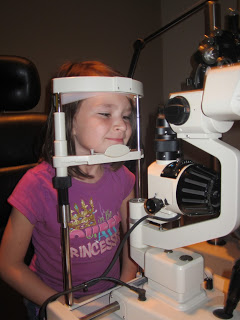commercialized over the years, so it’s easy to forget the things that really
matter when it comes to preparing our kids for a new school year – like an eye exam!
children get an eye exam from a Doctor of Optometry before starting school for
the first time, and every year after that, as kids’ eyes continue to develop
and change as they grow. But, if you’re a bit behind schedule, don’t worry –
better late than never, so make that appointment now.
I took my daughter for her first eye exam at three years old, and we’ve
continued every year since. The funny thing is, she would go every summer *hoping*
to be prescribed glasses, and actually enjoyed wearing fashion glasses until
last year, when at the age of seven, her turn for real specs finally arrived.
(Oh, how I wish glasses were cool when I was little!)
As a teacher, I clearly see (no pun intended) the importance of eye exams for young children. Did you know that one in four school-age children has a vision problem, and that 80% of a child’s learning and development is done visually? Vision is about much more than how clearly a child
sees, and many visual impediments show no overt signs. A child won’t
tell you they have a visual impediment because to them their vision is normal.
Since we are visual beings, problems with vision can appear in many forms other
than learning problems and squinty eyes: Vision affects speech, coordination,
attention and emotions.
According to Doctors of Optometry Canada, many children are misdiagnosed with learning or behavioural problems (like ADHD) when in reality they have vision problems. As well, one in six school-age children who experiences reading difficulties actually has a correctable vision problem. So much stress and worry could be avoided by a visit to a Doctor of Optometry.
course, kids have true academic problems like dyslexia, but I’ve found that
when the parent or teacher feels there may be a learning or attention issue,
one of the first things the school will suggest is to get an eye exam. It’s
best to be up-to-date so that the assessment process isn’t delayed.
serious vision problems are invisible to the untrained eye, and children will
nearly never report trouble with vision. For this reason, all children need comprehensive
eye exams.
more about coverage in your province. If your child is in JK (year one of kindergarten) several provinces run the Eye See Eye Learn program, which offers an eye exam and a free pair of glasses, if needed.
offering the Eye See Eye Learn program include:
Disclosure: This post has been brought to you by Doctors of Optometry, but the images and opinions are my own. For more information, please visit http://www.doctorsofoptometry.ca.






Had eye surgery when I was 6, but no glasses until 18. When they went on my face for the first time, it was a complete shock! Until then, never realized was half blind all my life, was convinced by all around to being merely stupid and lazy. A child cannot know they have problems without the reference frame of being born with clear vision to begin with.
Thanks for sharing that perspective. It's so true – kids assume they see fine because they don't know any different!
I didn't realize children should get a routine eye exam until I got a note from the school nurse a few months ago that said my son was showing signs of needing glasses. I attributed his slipping grades to harder material this year but you're right, it is important to consider your child's vision along with their ability to learn at school.
Doris Gibbs @ Moody Eyes